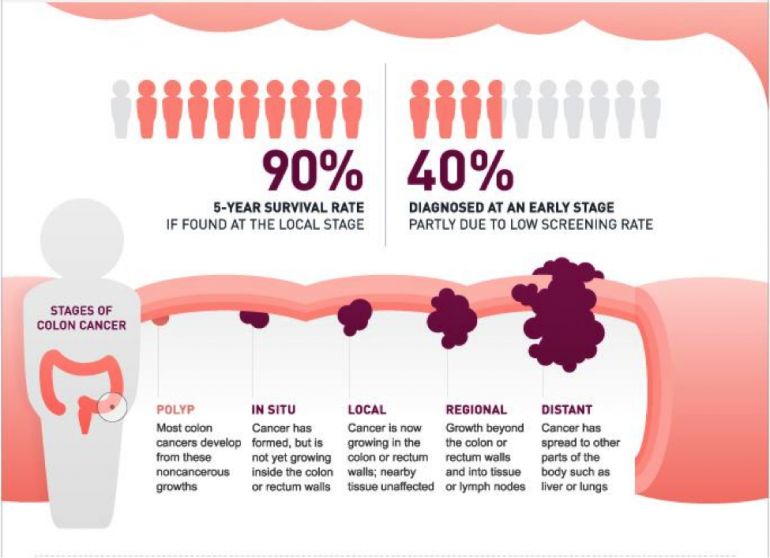Colorectal Cancer or colon cancer is the cancer of the colon and the rectum. Statistics prove that after lung cancer, it is the most common cancer across the globe.
The risk factors for developing it include
- Genetics: Inherited genes and shared environmental factors seem to be one of the leading risk factors that cause colon cancer, including racial and ethnic background.
- Lifestyle: Diet, bad habits (smoking and alcohol) and an inactive lifestyle make one more susceptible to this cancer
- General factors include age, a personal history of polyps/colorectal cancer etc.
While some studies suggest that risk of developing colorectal cancer is slightly higher in men, both are susceptible to it equally. With the improvement in screening techniques and treatments, the death rate from colorectal cancer has been reduced drastically over the last two decades.
In the early stages of the disease, the symptoms of colorectal cancer are minimal or completely absent, thereby making it difficult to be discovered. The symptoms tend to increase in the degree of severity and quantity as the disease progresses. However, this too differs from person to person. Since the symptoms aren’t discovered till the disease is way past the initial stage, it is recommended that everybody above 50 undergoes regular screening. In case there is a history of colorectal cancer in your family, you should talk to your doctor regarding when to begin your screening.
Many conditions, other than colon cancer, cause some of the early symptoms which can get confusing. Hemorrhoids, irritable bowel syndrome or an inflammatory bowel disease, are few of those conditions. While in most of the cases, these symptoms might not be colon cancer, it never hurts to be cautious.
Keep a look out for these symptoms and consult a doctor.
- Rectal bleeding
- Bloody stools
- Constant feeling that you need to have a bowel movement, but no relief after doing so
- Change in bowel movements that lasts for days; constipation, diarrhea or narrowing stool
- Exhaustion and weakness
- Abdominal pain and cramps
- Weight loss
Apart from the fact that these symptoms can be caused by various other ailments, they also vary from person to person. Based on the cancer’s location, size and growth, the severity of the signs and symptoms also differ. In some cases the signs are more noticeable even if they seem to be caused by some other disease, while in others, they are completely absent.
It is quite common for the symptoms caused by the colon cancer to make their appearance quite late, in most cases after the cancer has already grown and spread too much. So, it is best that you get tested on a regular basis so that you can catch it at an initial stage and find it easier to treat. Early screening also helps in preventing colon cancer as you can find and remove pre-cancerous growths known as polyps. Knowing these symptoms and understanding the risk factors that might make you vulnerable to the disease is the first step towards prevention of the same.















